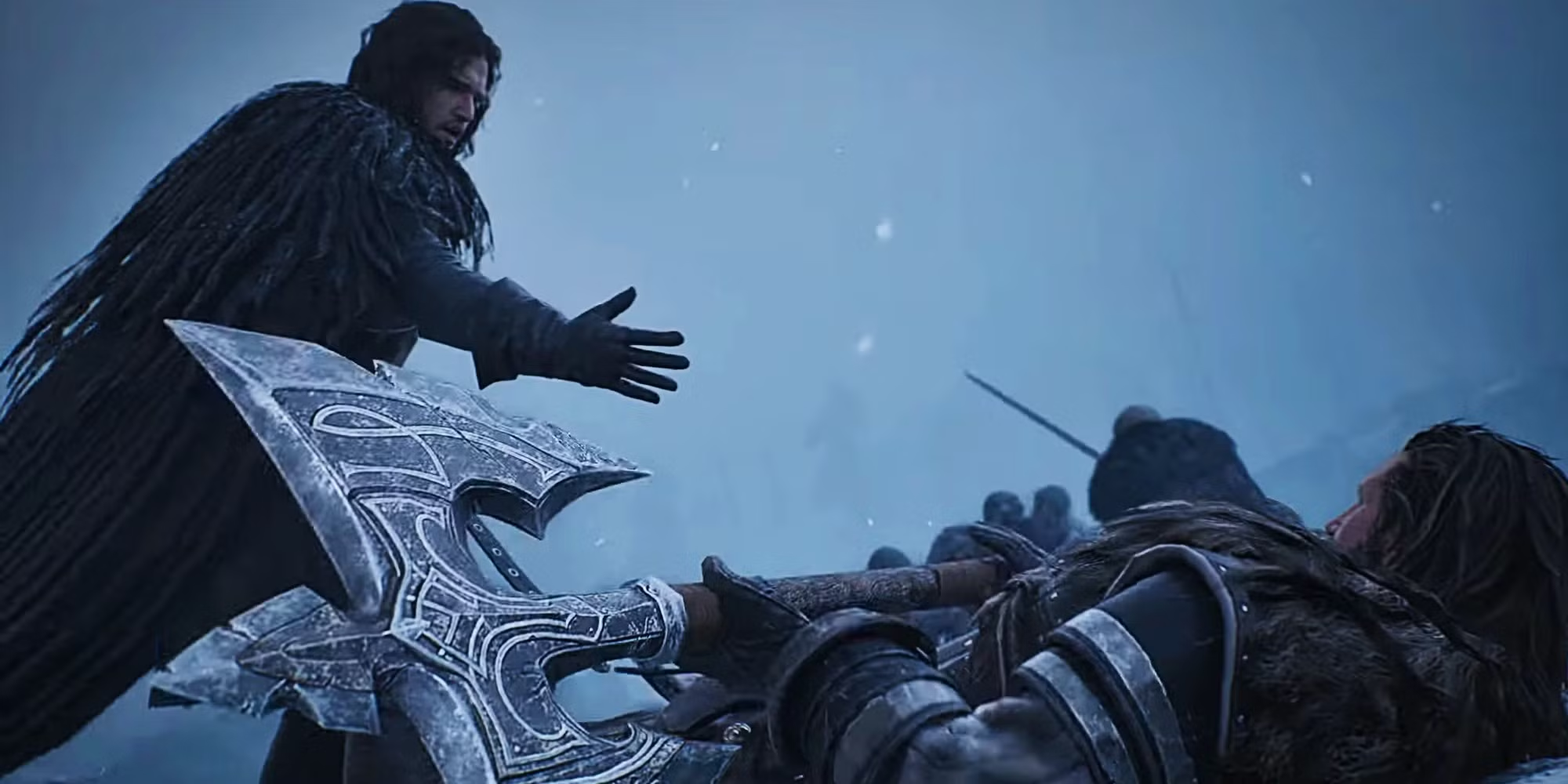George Carlin might have coined the seven words you can never say on television, but you can certainly say them in Westeros. Joffrey is “truly a little s—.” Tyrion wants to “piss” off the Wall. Viserys Targaryen threatens to let the “whole khalasar f—” Daenerys if it will get him his army. Arya is dismissed as a “little c—.” Thoros is a “bald c—sucker.” Cersei is (in a slight divergence from Carlin’s sixth bad word) a “brotherf—er.” Tyrion anoints himself the “god of tits and wine.”
But while Game of Thrones‘ swear words are intended to intensify and build character, the language itself undercuts author George R.R. Martin’s creation. Using modern English curse words doesn’t make Game of Thrones any funnier or scarier or more adult — in its worst instances, it can take you out of the story entirely.
Fantasy and science-fiction writers have a long history of inventing curse words that are believable for their worlds. J.R.R. Tolkien, who worked meticulously on the construction of Middle Earth and its languages, understood that necessity for unearthliness. Words like “f—” are pedestrian English slang, and don’t belong in the mouth of an elf or wizard. “Fool of a Took,” by that same token, is withering when it comes from Gandalf.
When language breaks with the register of the world that has been constructed, it is jarring and takes the audience immediately out of the story. For example, while there was light swearing throughout the first 50 years of Star Trek, but when two characters used “f—” for the first time in 2017, “it just felt … wrong,” a columnist at Digital Spy complained. HBO’s Game of Thrones has used swear words from the start — they’re liberally dolled out in the books, too — but I would argue that Jon Snow referring to White Walkers as “f—ers” before the stand at Hardhome is just wrong, too.
Martin, though, has never been precious about English curse words. His characters are so famously foul-mouthed that Game of Thrones was jokingly retitled Knights Who Say ‘F—‘ in one mock cover. A fan even took the first two seasons and compiled a video of “all the swearing from Game of Thrones,” which is weirdly hypnotizing to watch. Martin’s use of English cussing isn’t even limited to dialogue; it finds its way into his exposition, too:
“Please,” Ned said, “my daughters …” The door crashed shut. He blinked as the light vanished, lowered his head to his chest, and curled up on the straw. It no longer stank of urine and s—. It no longer smelled at all. [Game of Thrones]
Even the acknowledgements section isn’t safe. “This one was a b—-,” Martin quips in the back matter of A Feast for Crows.
Still, in rewatching Game of Thrones, I’ve found myself increasingly impatient with all the “f—s” and “c—s” that are lazily dolled out. I find it particularly irritating because some curse words are translated to the register of Westeros: the pluralized “Gods,” for example, or “seven hells,” which are English curses that have been adapted to the polytheistic religion of the realm. Likewise, Robert snaps “the Others take your mild snows,” which a reader can intuit is a curse even without Martin signposting it “Robert swore.” The Dothraki have their own bad words: “ifak,” a dismissive word for “foreigner”; and “choyo,” a playful slang word for someone’s rear-end. Qotho at one point swears “an oath so foul it seared the air,” although it is never put into words. In High Valyrian, there is additionally the enraged curse word “dracarys.”
Perhaps this can all be explained by assuming English is Westeros’ Common Tongue, as is suggested at one point in A Feast for Crows:
She had surrendered her virtue at six-and-ten, to a beautiful blond-haired sailor on a trading galley up from Lys. He only knew six words of the Common Tongue, but “f—” was one of them — the very word she’d hoped to hear. [A Feast for Crows]
So we might let the English curse words stand, except that Martin has modeled Game of Thrones off of medieval Europe, a period that lasted roughly from the 5th century to the Renaissance. The problem, then, is that people weren’t saying “f—” in the Middle Ages; the word didn’t come to be used as a noun until the 1670s, and the phrase “f— off,” deployed by the Hound in Season 7, wasn’t even a thing until 1944. If Martin were to have faithfully modeled Westeros on medieval Europe, Joffrey would actually be dismissed as a “fopdoodle,” Tyrion skewered as a “scobberlotcher,” Cersei a “bedswerver,” and, in dramatic exclamation at seeing the army of White Walkers descending on Hardhome, Jon Snow might have shouted in alarm, “Bejabbers!”
That would hardly have the same punch, would it? While Tolkien might not have needed English swear words to intensify Lord of the Rings, Martin at least deploys his with intention. Consider, for example, the way lowborns and common soldiers’ speech is weighed down by curse words, while highborns like the Starks swear much more rarely:
“F— me, Jamie Lannister,” blurted one grey and grizzled man-at-arms. “It’s the bleeding Kingslayer, boys. F— me with a spear!”
“Who might you be?” Jamie asked.
“Ser used to call me S—mouth, if it pleases m’lord.”
[…] “Charming. Do you command here?”
“Me? S—, no. M’lord. Bugger me with a bloody spear.” [A Feast for Crows]
The cussing isn’t gratuitous, even if much else in Game of Thrones is — in almost all instances in both the books and the TV show, swear words build character. They paint, however crudely, a picture; as Slate notes, characters even have their own pet phrases, such as “Tyrion Lannister’s especial fondness for ‘bastard’ and Cersei’s penchant for ‘whore.'”
While I recognize that there is at least an internal logic to the cursing, I still cringe every time I hear a “f—” or its ilk in Westeros or Essos. Make it “föck.” Or “frak.” Or, heck, make it “shazbot.” But for all the “f—s” intended to build character, the very same pull down Game of Thrones‘ veil.




















![[Book Review] The Blade Itself (The First Law Trilogy) by Joe Abercrombie](https://bendthekneegot.com/wp-content/uploads/2018/01/1516047103_maxresdefault-218x150.jpg)

















